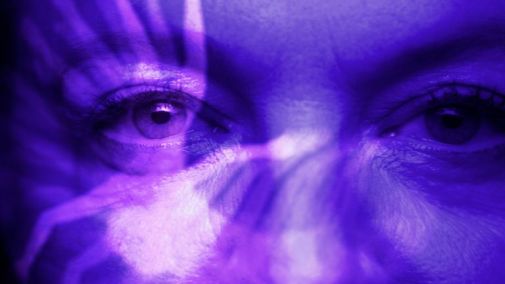Doc Corner: 'Brainwashed: Sex-Camera-Power' and the Male Gaze
 Thursday, October 20, 2022 at 3:00PM
Thursday, October 20, 2022 at 3:00PM By Glenn Dunks

Hmm. This is a curious one, isn’t it?
Brainwashed: Sex-Camera-Power is a cinematic adaptation of an on-stage presentation by filmmaker Nina Menkes on the male gaze. Originally titled “Sex and Power: The Visual Language of Oppression”, Menkes has reworked the live show into a curious hybrid that deconstructs the way many movies are shot and framed in a way that subjugates the female characters. The first image we see is of Ana De Armas as the nude advertisement in Blade Runner 2049 before dissecting over 170 films in one form (very briefly) or another (more up close and personal).
It's uncomfortable to see Menkes lump many great movies, including those directed by women, that are often quite clearly about what she is discussing—films like Lorene Scafaria’s Hustlers, Julia Ducournau’s Titane or Barbara Loden’s Wanda—with glowing self-critiques of her own body of work. Even when concessions are made, as with Jean-Luc Godard’s Contempt and the studio mandate that he fought against to include an extended nude shot of Brigitte Bardot, Menkes nonetheless shows little forgiveness.
Furthermore, after complaining that Hollywood forgets women can be interesting and sexual after a certain age, it comes across as unfortunate that she would take such a sex-negative approach to women on screen in some instances. I’d have appreciated hearing from the likes of Scafaria, but presumably they wouldn’t agree with what she thinks of how their movies work with the female body. And to be perfectly honest, Kathryn Bigelow has every right to feel slighted, criticised as she is here for having won Oscars for a movie about men and war. That kernel of an idea is more offensive than the lazier idea of how Phantom Thread has Daniel Day Lewis look at his female co-stars.
To say nothing of the absence of much queer gaze until its very end.
And yet, I cannot deny that Brainwashed gives much food for thought. As some damning clip was playing, I kept finding myself thinking 'well, filmmakers are working with the particulars of a story and what is realistic within it or what works for the movie.' But, then, yes, I would catch myself. No, she’s right. There are ways to shoot and edit that are too often permitted when looking at women and rarely with men. The concept that men are more likely to be shot in full-body when in states of undress, while women are more likely to be cut up by the camera’s frame, body parts specifically placed on display, is a particularly intriguing one. It probably won’t be anything new to anybody who has studied film and feminism and the male gaze, but I appreciated it nonetheless. Likewise a sort of mini scene breakdown from Raging Bull offered something that I had genuinely never considered before where women’s silence becomes deafening.

Similarly half-and-half is the filmmaking itself. Menkes relies extensively on her own presentation of the material to a room of onlookers. There’s too much of that. Especially since when she steps outside of that, Menkes’ directorial talents impress. It’s like half a TED talk and half a visual representation of ideas. I’d have preferred more of the latter; original visual flourishes that are well integrated with the copious film clips.
Menkes has also amassed a very impressive roster of female and nonbinary filmmakers, names that are always going to be fascinating to hear from. I was particularly taken by Daughters of the Dust director Julia Dash, appearing here in tableau wearing a vivid yellow patterned dress in front of a wallpapered wall covered in blue palms and ferns with an actual plant to her side. It’s a visual image that makes me wish all talking head interviews were as electric. There’s also Penelope Spheeris, Rosanna Arquette, Eliza Hittman, Catherine Hardwicke, Joey Soloway and more including Laura Mulvey who is the one actually credited with coining the phrase “male gaze”. I wonder what a film about her would be without a director who is very interested in selling her own wears even amid the strong work offered up.
Does Menkes simplify the message of Mulvey’s near-50-year-old idea? I’d argue yes. At nearly two hours, it’s probably too long to make the same point over and over again with Menkes herself at the centre when she is routinely not the most interesting thing (or what audiences will naturally gravitate towards). Menkes’ lecture is quite interesting and jam-packed full of information that many likely haven’t thought about. Men watch. Women are watched. But as a movie it struggles because it sidesteps context and because it is too often awkwardly stagebound. Up to and including images of Menkes being watched from a seat in the front row over film clips. I have to wonder if she recognises the irony there.
Release: Opens this Friday via Kino Lorber in NYC and LA with more to follow.
Award chances: This isn't the sort of thing that the Academy's documentary branch gravitate towards stylistically or subject-wise.
 Blade Runner 2049,
Blade Runner 2049,  Doc Corner,
Doc Corner,  Nina Menkes,
Nina Menkes,  Review,
Review,  documentaries
documentaries 


Reader Comments (1)
everything i've read about this movie tells me i would hate it. Context, as ever, is utterly important and when people make thesis without considering context it makes me so crazy.
Also i find critiques of the male gaze that take offense with women being pictured in erotic ways are erasing the fact that gay women exist and also like to look at women. I just watched the latest episode of QUEER FOR FEAR on Shudder and it was fascinating to hear all the talking head bisexual and gay women talking about looking at the eroticized women in horror films (usually shot and directed by men).
There's nothing inherently wrong with using eroticism. It's all about context whether you're being exploitive or not. Also we can only rarely know about how the actors felt about things... and they're feelings about being an object of desire for the camera surely cover a vast array of differences just as real people feel vastly different about themselves in sexually charged situations than their neighbor might.